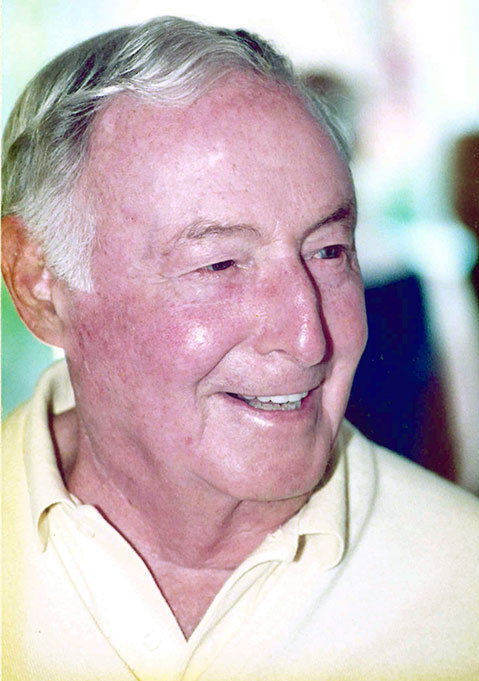Joe Scher’s pragmatism and penchant for sound advice was obvious early on. At 24 and just starting out, he was asked by a friend whether it was acceptable to get a haircut during the workweek and count it as a business expense or if he should wait until the weekend. Joe answered, “If it grows on company time, it can be cut on company time.” His wit and wise counsel earned Joe admirers; his kindness and loyalty brought him friends and the love of family; and his generosity and vision strengthened the communities he called home.
Born in Chicago in 1924, Joe was never one to mince words. Covering his frustration in the face of verbose answers to simple questions, his wife of 22 years, Lila, said, “He would often snip, with a smile, ‘I thought I understood until you explained it.’”
Joe’s impatience was often gilded with his sense of humor, with sayings such as “I need that like a moose needs a hat rack!” That impatience may have been tied to the ambition born of a Depression-era childhood. His family, Jewish immigrants from Hungary and Lithuania, struggled as Joe was growing up, moving 11 times in 10 years, sometimes in the middle of the night.
Years later, he recounted to his daughter Julie, “The fact that my parents struggled, always, had a definite effect on me … I didn’t want to have the struggles my parents had, and I made up my mind that that wasn’t going to happen to me. Their whole life, my parents lived paycheck to paycheck … If there was a missed paycheck, it was a disaster in the house. When you listen to that through your whole childhood, it really has an effect on you.”

While money might have been scarce, a sense of ethics and morality at home was not. Joe said he grew up with a very strong sense of right and wrong and believed steadfastly in always telling the truth. Returning from his World War II service as a cryptographer in the South Pacific, Joe finished college at the University of Illinois on the GI Bill while also taking some classes at Northwestern University, where he met his first wife, Eleanor (1926-1991), the mother of his four children, Marilyn, Mark, Julie, and James.
After a few tries on his own but in need of a job, Joe became a salesman with Enterprise Paint Company. He singlehandedly created paint departments in large chain department stores, including Macy’s and J.C. Penney, which had never conceived of selling paint. A friend from college, Bob Grayson, recounted Joe’s business success strategy: “[He] showed me a sales plan that he developed, including illustrations and ads of products, consumer benefits, and more. I was in awe … Joe taught me how a plan was a guide to the future.”
Over more than 30 years — 10 spent as company president — Joe grew Enterprise from a small company on Chicago’s South Side to a major industry competitor. He went on to the advertising specialty industry and a discount eyeglass chain. He also partnered with his son Mark in the commercial real estate business, developing and acquiring over three million square feet across the western United States.
Eleanor and Joe moved to Santa Barbara in 1981. When Eleanor passed away unexpectedly, Joe married his dear friend of over 40 years, Lila. They spent the next 22 years enjoying life, family, and friends together, traveling, and helping strengthen their community.
Joe was as committed to giving back as he was to business. A philanthropic force in the Chicago and Santa Barbara communities, he served as president of the Chicago Chapter of the American Jewish Committee and as a director of the Birchwood Club. In Santa Barbara, he served on the board of the Santa Barbara City College Foundation for nearly 20 years, including two years as president and later emeritus. Foundation Development Director Gretchen Hewlett remembered Joe as “clear-eyed and unsentimental about the mission of community colleges.” He supported a broad spectrum of programs and initiatives — including an entire digital arts computer laboratory — for single-parent students, the Luria Library, and theater and studio arts scholarships.
Joe also served on the board of the Jewish Federation of Greater Santa Barbara for 18 years, setting fundraising records and helping to transform the organization. He and Lila funded the Bronfman center’s library and supported programs ranging from weekly free lunches for seniors to Holocaust education and aid for local survivors to early child care. “To say that the [federation] would not be where it is today without Joe Scher would be a huge understatement,” said Federation Executive Director Michael S. Rassler. “Joe was there at the beginning, on the ground floor, helping to raise funds and rally supporters.”
Joe also took on the presidency of the board of Camerata Pacifica and served as a director of Speaking of Stories while generously supporting the Music Academy of the West, Hillel Foundation, and many other organizations. He was a founding member of the Scleroderma Research Foundation along with his late daughter-in-law, Sharon Monsky, who suffered from this progressive, debilitating disease.
The impact of Joe’s life and personality will reverberate for years to come because he was a mentor to so many. Joe touched and helped to shape countless lives, and it is with a smile that his friends and loved ones recount the endearing line that summed up his wry approach to life: “Everyone is entitled to my opinion.”
